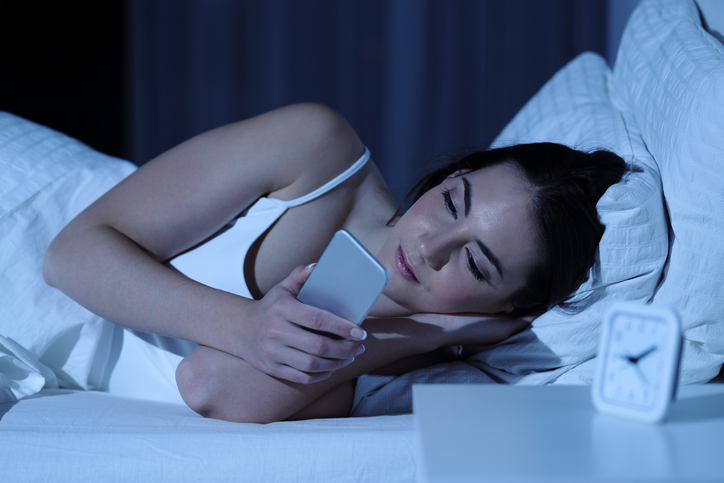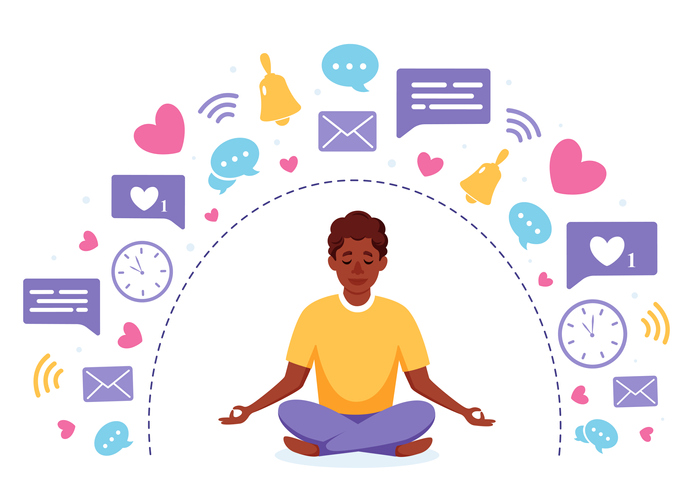Still Checking Your Emails After Dinner? Doing So Can Put Your Health At Risk!

By Joy Stephenson-Laws, J.D., Founder
If the line between “work time” and “personal time” was getting blurry before the pandemic, it’s now safe to say that for many people that line has now disappeared. This is not very surprising given that 71 percent of us are now working from home (WFH) and more than half want to continue doing so after employers fully open their offices.
There are many benefits to WFH, or hybrid schemes that combine WFH and work from office. But we need to keep in mind they also pose very real health risks both to ourselves and our families by allowing – and even encouraging – our work to encroach on our personal and family time.
What is insidious here is that this attack on work-life balance started innocently enough. For many, it began well before the pandemic when home computers and then smartphones gave us the ability to check our emails 24/7.
Given the power of FOMO (fear of missing out), fueled to a certain extent by social media and the ability to be connected 24/7, the temptation to peek at our emails becomes irresistible. Throw in having to WFH – which eliminates in-person social connections at work – and you have a situation like the one in the movie Her, where everyone is seen walking around interacting more with their cell phones than with their surroundings or other people.
Today, the average office worker may receive over 120 emails every day, which translates to 15 emails an hour.
If you think I am exaggerating the problem, consider that 43 percent of white-collar workers reported checking their email “every couple of hours’’ outside of work. Only 24 percent reported “never” checking their emails outside of work hours. And in one study from Australia, researchers found that some 55 percent of participants reported digitally contacting their colleagues about work during the evenings. Around 30 percent further admitted to contacting their colleagues over the weekends and – here is the kicker – expecting a same-day response to their communication.
Various researchers also looked at the impact being always connected had on the psychological and physical health of participants. Not surprisingly, those checking mails at all hours experienced more risk factors than did their counterparts who were able to “leave work at work.” What was somewhat alarming, was that being connected and continuing to check mails outside of work hours not only impacted the wellbeing of the employees but also of their families and loved ones.

The first impact all this email checking has is that it increases our stress levels. Looking again at the Australian study, employees who had managers who expected them to check emails after work had much higher levels of psychological distress than those who did not (around 70 percent versus 45 percent). They also reported more emotional exhaustion (64 percent versus 35 percent) and physical health problems, including headaches and back pain (22 percent compared to 12 percent).
Being on a constant lookout for mails from work can impact our metabolism and negatively affect our immune systems, increasing our risk for a variety of health problems such as cardiovascular disease, hypertension and stroke. It also can increase our risk for mental health conditions such as anxiety and depression.
One study done by the University of California, MIT and Microsoft suggested that, in general, for every hour spent on emails, the higher the hourly levels of stress. And another study by researchers at Harvard Business School and Stanford University compares the damage of work stress to secondhand smoke.
If that were not enough to convince you to put down your smartphone after hours, other research suggests that even thinking about checking our email can be harmful. Just feeling that we are expected to be available can cause anxiety and stress. So, this means we don’t even have to be checking our mails to suffer the health risks of doing so after hours.
We also should not fool ourselves thinking that if we check emails outside of work that we may be harming only ourselves. Worrying about our emails or thinking about them when we are not officially “on the clock” also creates stress for our spouses or significant others. So, we may be putting our loved ones’ health and well-being at risk.
Be proactive and get off the email treadmill
Reducing the stress and being proactive about protecting ourselves from the health risks of constantly being connected to our emails requires two things: first, we need to change the behaviors that got us going down the email rabbit hole, and second, we need to give our bodies the nutrients it needs to not only combat stress but also protect them from its deleterious health effects.
I often like to say that when it comes to protecting our health, we need to look at things we can control and things that we can’t. And while we may not be able to control everything in our work life, we can, in my opinion, control whether and how much we check our emails outside of work. If you find it really challenging to unplug, here are some tips:
- With WFH now being the norm for so many people, it is more important than ever to define and be disciplined about respecting work time and personal time. Try to keep the same routine as you would if you went to the office, including arrival time, lunch time and ending time. Ask your spouse and family to respect these times much as they would if you went to the office.
- If you are back at the office – or perhaps never stopped going – it is important to try and disconnect emotionally and not bring work (or the office) home with you. Remember that doing so also can impact your family’s health.
- Your email app, believe it or not, can also help you disconnect from emails outside of set hours or at least reduce your urge to constantly check them. While not all apps are the same, here is what I do that helps me keep email in check during off hours:
- Turn off the “push” notifications to stop the smart phone from beeping, buzzing or vibrating every time a mail arrives
- Turn off the “fetch” mail feature during the evening so that it is not constantly checking to see if I have new mails
- Create “must see” lists of people whose mails I really do need to know about so that I will be notified if an important mail comes through but not notified about the others
- Hit the master “do not disturb” button a few hours before I go to bed – if you find this too difficult, then just turn the phone off completely until the morning
- If you absolutely, positively cannot go “cold turkey,” set your device to remind you to check mails every two hours or so but no more until you are fully weaned from your FOMO need to check emails after work
- Work on learning how to be “present” with your friends and family (and yourself) while not at work to help your mind disconnect – there are good programs about this on the Internet - just do a search for “mindfulness” (to get you started, check out this pH blog)
While you are working on cutting the email umbilical, keep in mind that stress can have a negative impact on our diets and nutritional balance by triggering “stress eating.” This usually means devouring processed junk foods and sugar which may leave you feeling good for a bit. But this is very fleeting and will ultimately leave you feeling lethargic and cranky.
Make an honest and good effort to include plenty of nutrient-dense foods such as fruits, vegetables, legumes, whole grains, and lean protein (from sources such as fish) into your daily diet no matter how stressed you may feel or how busy you may be.
Check out this pH Labs blog about specific nutrients and foods that may help you better cope with stress and anxiety. And consider taking a comprehensive nutrient test. You want to make sure you have an adequate and balanced amount of all the feel-good nutrients found in the healthy foods you are eating.
I also highly recommend getting enough exercise, which is a known stress buster. You may even want to consider replacing your after-dinner email session with an after-dinner walk. Just be sure to not take your smart phone with you to avoid the temptation to check mail while you are walking (which could also cause you to walk into a telephone poll if you are not careful). Walking after dinner also has a host of health benefits, including weight management, blood sugar control and better digestion.
Enjoy your healthy life!
The pH professional health care team includes recognized experts from a variety of health care and related disciplines, including physicians, attorneys, nutritionists, nurses, and certified fitness instructors. This team also includes the members of the pH Medical Advisory Board, which constantly monitors all pH programs, products, and services. To learn more about the pH Medical Advisory Board, click here.







